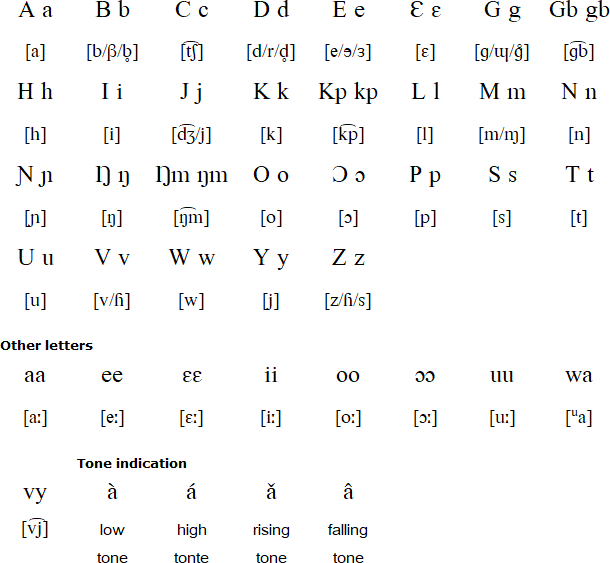Eton is a member of the Beti group of Bantu languages. It is spoken by about 250,000 people in Cameroon, in particular in the Lekié department of the Centre Region of Cameroon, and also in Yaoundé, the capital. In rural areas people of all ages speak Eton, however in Yaoundé younger people speak only French.
Eton is also known as éton or Ìtón. There are two main dialects: the Northern Eton (ìtón ŋ́kē) and the Southern Eton (ìtón ɛ́kwɛ̄). It is closely related to Ewondo, and also Mengisa, Bulu and Fang.
There appear to be several ways to write Eton with the Latin alphabet. The one used here is the practical orthography used in Mark Van De Velde's A Description of Eton.

Download an alphabet chart for Eton (Excel)
Information about Eton
https://en.wikipedia.org/wiki/Eton_language
https://fr.wikipedia.org/wiki/Eton_(langue_bantoue)
https://www.ethnologue.com/language/eto
A Description of Eton - Phonology, morphology, basic syntax and lexicon (PDF)
Aka, Bafaw-Balong, Bangi, Basaa, Bemba, Bembe, Bena, Benga, Bhaca, Bube, Bukusu, Bulu, Central Teke, Chichewa, Chokwe, Chuwabu, Comorian, Dciriku, Digo, Duala, Eton, Ewondo, Fang, Ganda/Luganda, Gogo, Gusii, Gwere, Haya, Hehe, Herero, Ibinda, Ikizu, Ikoma, Jita, Kabwa, Kako, Kamba, Kiga, Kikuyu, Kimbundu, Kinyarwanda, Kirundi, Kisi, Kogo, Komo, Kongo, Konjo, Koti, Kukuya, Kunda, Kuria, Kwambi, Lambya, Lingala, Loma, Lozi, Luba-Katanga, Luchazi, Lunda, Luvale, Luyana, Makaa, Makonde, Makhuwa, Mandekan, Maore, Masaaba, Mbama, Mbere, Mbukushu, Mbunda, Mbuun, Mende, Mongo, Mpiemo, Mushungulu, Mwani, Nambya, Nande, Ngoni, Nkore, North Teke, Northern Ndebele (South Africa), Northern Ndebele (Zimbabwe), Northern Sotho, Nyamwezi, Nyakyusa, Nyemba, Nyole, Nyoro, Nyungwe, Nzadi, Oroko, OshiWambo, Pagibete, Punu, Ronga, Safwa, Sena, Sengele, Shona, Soga, Songe, Southern Ndebele, Southern Sotho, Sukuma, Swahili, Swati, Tanga, Tembo, Tonga, Tooro, Tshiluba, Tsonga, Tswa, Tswana, Tumbuka, Umbundu, Venda, Vili, Vwanji, Xhosa, Yakam, Yansi, Yao, Yasa, Yeyi, Zigula, Zinza, Zulu
Languages written with the Latin alphabet
Page created: 27.04.22. Last modified: 28.04.22
[top]
You can support this site by Buying Me A Coffee, and if you like what you see on this page, you can use the buttons below to share it with people you know.

If you like this site and find it useful, you can support it by making a donation via PayPal or Patreon, or by contributing in other ways. Omniglot is how I make my living.
Note: all links on this site to Amazon.com, Amazon.co.uk
and Amazon.fr
are affiliate links. This means I earn a commission if you click on any of them and buy something. So by clicking on these links you can help to support this site.
[top]